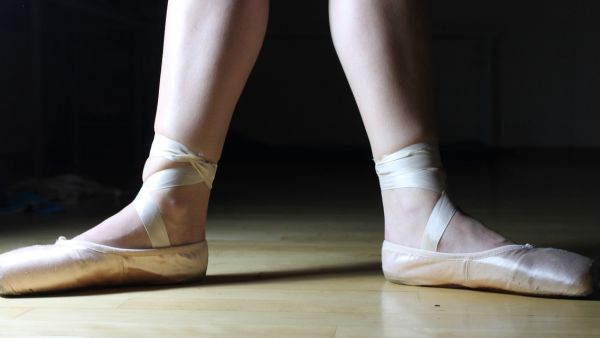A Detroit woman was ‘Zoombombed’ after hackers broke into the video conferencing app while she taught a virtual stretching class and began hurling racial slurs, mimicking fake Asian accents, and accusing her of giving them coronavirus.
Joori Jung, a Korean woman from Seoul who moved to the United States in 2009, is the owner of ArtLab J, a dance studio in Detroit that was forced to close last month due to the coronavirus outbreak.
Like many other businesses, Jung moved her lessons online, offering students virtual classes through Zoom, the popular video conferencing app that has become the main method used by workplaces to continue operating.
On Monday, she began teaching a stretching class early in the morning. The lesson was open to the public and posted online.
At around 6:45am, just 10 minutes after the class started, she noticed two men who joined the virtual conference.
‘What’s up my [expletive]?’ one of the men is quoted as saying by the Detroit Free Press.
Jung, who was doing a stretch, got up from her pose and approached her computer to address the matter.
She noticed that one of the men was seen in the video window while the other was not seen but heard.
‘Why the (expletive) are you looking like that, why are you smiling?’ one of the men asked.
Both of the men then began to talk with fake Asian accents. One of the men asked Jung why she gave him the coronavirus.
‘It was very embarrassing, because my students were watching, but I kept trying to smile through it,’ Jung told the Free Press.
As a significant number of businesses have been forced to shift to a work-from-home model, many of them have come to rely on Zoom to conduct their affairs.
But that has left them vulnerable to online hackers who join the video conferences uninvited and stir up trouble, usually by spewing racist taunts and abuse.
Jung posted her classes online and free to the general public, but the ‘Zoombombing’ episode has now forced her to require students to register in advance.
Those students would then receive an emailed link to the Zoom chat as well as a password.
She told the Free Press she preferred to offer live classes on Zoom rather than just post instructional videos online because she liked the interactive aspect of sharing the experience in real time with students.
‘It’s not just the physical movement, we’re sharing the energy,’ she said.
ArtLab J offers a variety of dance styles, including barre, contemporary, and K-Pop.
Jung said that in the 10 years she has lived in the US, this was the first time she has ever experienced overt racism.
‘Living in Detroit, and I'm an Asian woman, people worry about it,’ she said.
‘But actually I've never worried about that, even when people call out to me, saying “Hey China!”
‘It's a big country, so sometimes people don't know about smaller countries.’
She added: ‘People [are] targeting Asians, and I get why people could think that way, but coronavirus shouldn’t be related to a group.’
Jung said she was saddened that people were turning against one another during a time of crisis.
‘So many people are losing their jobs, our kids can't go to school, why do we need to hurt each other?’ she said.
‘I’m going to continue.
‘This has not made me feel afraid, if anything this has made me feel like I need to speak up to educate more people.’
She said she was moved to have a conversation with her four-year-old son about possible racial discrimination he may face.
‘You should know that our skin is different, but we are all the same,’ she said she told her son.
‘The most important thing when we meet each other is to look inside, not outside,’ Jung said.
‘We need to stop looking at differences, we are the same blood.’
In recent days, there have been several other high-profile incidents of ‘Zoombombing’ that have sparked outrage as well as demands for a crackdown.
On Friday, hackers broke into a Zoom video conference and began hurling racial slurs at K’Andre Miller, a highly regarded 20-year-old hockey prospect for the NHL’s New York Rangers.
Miller, who is African-American, was taking questions from fans in an interactive chat a month after signing an entry-level contract with the Rangers, according to The New York Times.
Miller, who was chosen 22nd overall by the Rangers in the 2018 entry draft, is a standout defenseman who has played collegiately the past two seasons for the University of Wisconsin.
The hacking was condemned by the Rangers as well as the National Hockey League, both of whom put out statements vowing to investigate.
Last week, anti-Semitic trolls posted offensive memes and images during a Zoom videoconference attended by 150 students from New York City’s Yeshiva University.
The incident took place while the school’s president, Dr. Ari Berman, gave a lecture about Passover, the high holiday that begins this coming week.
Shortly after the speech began, however, several anonymous hackers began posting offensive neo-Nazi-themed images and memes, including references to ‘dirty Jews’ as well as slurs related to the Holocaust.
‘IMMA GAS YOU ALL,’ read one meme. Another claimed that Holocaust ‘never happened.’
Another wrote: ‘hail hitler.’
The university shut down the chat in an effort to purge it of the hackers, but some of them could not be kicked out.
Berman continued giving the speech while the others tried to ignore the trolls, according to Huffington Post.
Zoom said that it estimates some 200 million people used the app on a daily basis in March - a considerable increase from the usual 10 million people who used it every day in December.
Zoom, which was not prepared for huge increase in its daily usage, put out a statement last month in response to the repeated instances of ‘Zoomboming.’
The company posted a blog item which gave users tips on how to keep out unwanted guests from their chats.
But the phenomenon of ‘Zoombombing’ has nonetheless caught the attention of the Federal Bureau of Investigation.
The bureau’s Boston office released a statement last week warning the public to take measures to protect themselves against abusive hackers.
The FBI listed two examples where hackers had 'Zoombombed' schools which have closed because of the deadly virus and which are now teaching classes online.
A Massachusetts high school reported that an unidentified individual dialed into the virtual classroom and yelled a profanity at the teacher before shouting the teacher's home address.
Another school in the same state reported the appearance of an unknown person with swastika tattoos.
Using the hashtag 'zoombombed,' social media users have testified that they suddenly saw pornographic or racist images on their screens while using the app.
The FBI recommended that Zoom users make all meetings private and avoid screen sharing to combat would-be hackers.
Last week, a New York mother revealed that her teenage daughter's 'Ask the Rabbi' class was hijacked by a group of boys who shouted anti-Semitic slurs before one stripped out of his clothes.
Michelle, a Long Island mother who chose not to use her last name, said that her 14-year-old child had been in an online class for her private girls' modern Orthodox high school when it was 'Zoombombed'.
'First, the screens were completely black and they were saying all these anti-Semitic things, cursing them out, saying you f*****g Jews, et cetera,' Michelle explained to CBS News.
'And then one boy suddenly stripped and was naked.'
Michelle described her child as being upset by the ordeal.
'She was very embarrassed by it, and she just said, "I can't talk about it,"' Michelle added.
Silicon Valley-based Zoom said it 'takes its users' privacy, security, and trust extremely seriously.
'During the COVID-19 pandemic, we are working around-the-clock to ensure that hospitals, universities, schools, and other businesses across the world can stay connected and operational,' a spokesperson told AFP.
New York State Attorney General Letitita James sent a letter to Zoom asking the company about its security and privacy protections.
James wrote that she was ‘concerned that Zoom’s existing security practices might not be sufficient to adapt to the recent and sudden surge in both the volume and sensitivity of data being passed through its network.’
‘While Zoom has remediated specific reported security vulnerabilities, we would like to understand whether Zoom has undertaken a broader review of its security practices.’
This article has been adapted from its original source.








